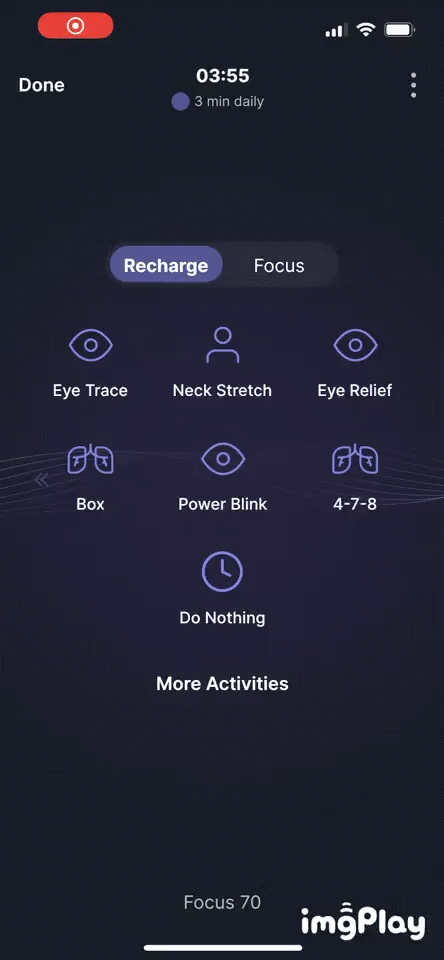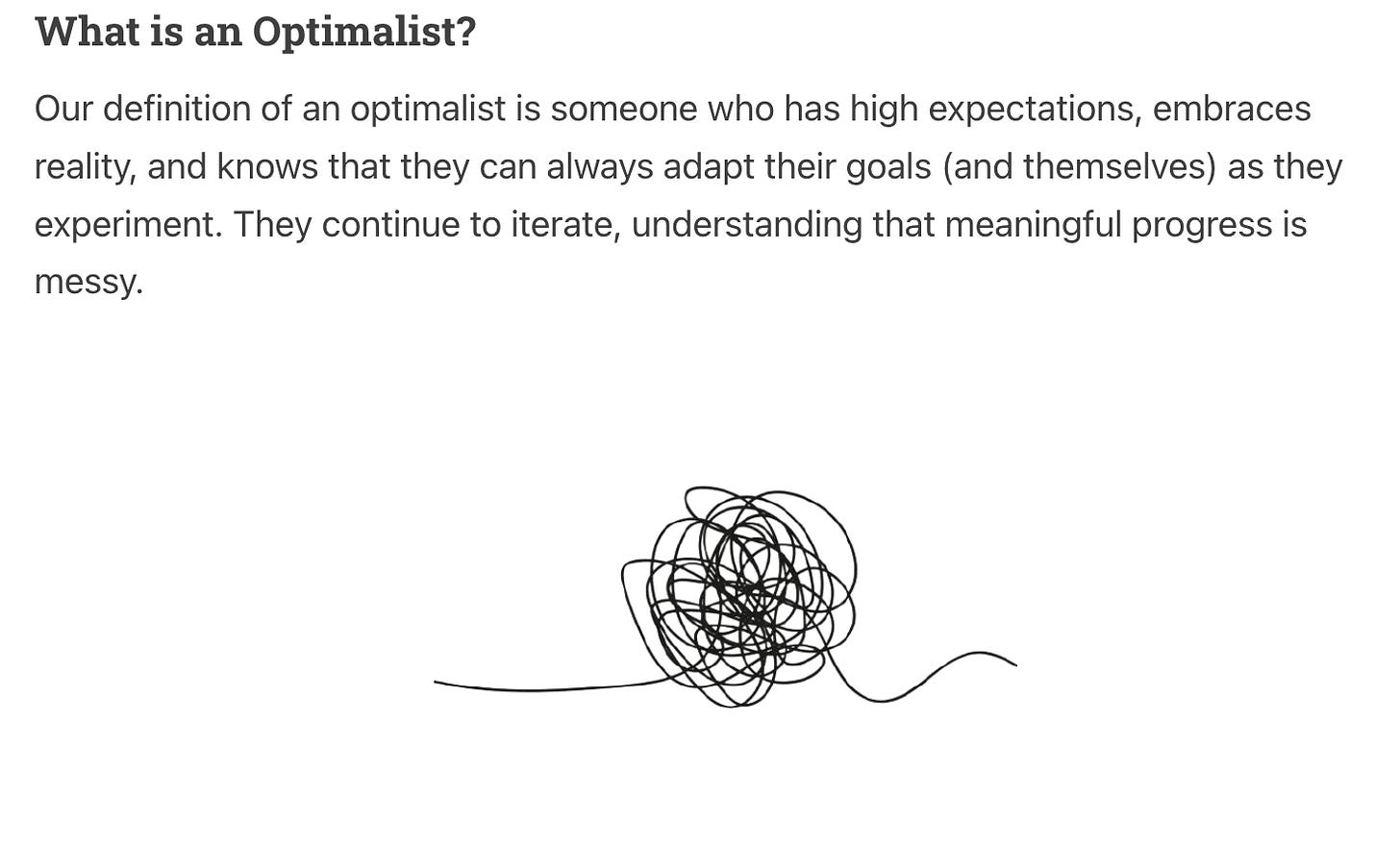Welcome to the 40 new subscribers we’ve received since our last issue. I’m glad to see the topic of social media’s effect on us resonating. And thanks to all who sent in feedback! Anytime you like what you read, remember to click the heart button at the top of this post. And don’t be shy! - we’d love to hear from you in the comments, if you’re so inclined.
_______
Happy Anniversary, Optimalists!
On Jan 28, 2022, we published the first edition of The Optimalist, and what I thought I’d do for this 1-year anniversary edition was a quick look back on where we’ve been. One year ago, we weren’t sure what this would look or sound like. We called it The Optimalist because we wanted to offer a new way to embrace difficult ideas. It was an invitation to a mindset shift. And it was the foundation of a community.
For us, The Optimalist would be a place to work out our often in-progress new ideas and share them with educators. As the definition states, we wanted to demonstrate that messy progress is meaningful progress, that adaptation is not only possible but necessary. We knew that what we were doing was important enough to risk being wrong or not knowing where it would lead. We needed to go through this evolution and writing was a big part of bringing us to this point.
Also, for us, evolution is a part of community, and community is where we started. Coming together around a shared purpose is not only an exercise in finding belonging; it’s an opportunity to grow together and change one another. The emerging dynamic is one of collaboration, struggle, and support - a push and pull in the name of progress.
Personally, I love being part of a project that allows discoveries to emerge. You can keep moving in the same direction, but along the way discover important details that push you forward. Each detail becomes an integral part of the process of innovation. Our own discovery process came from building a software product - Focusable - alongside this community.
While The Optimalist started as a concept, it soon filled with people. Educators from all disciplines and career stages. You have challenged us to think about everything from the meaning of self regulation, the way mindfulness fits into the school day, and even the placement of features in the app. You’ve invited us into your own communities, hosted Twitter chats with us, participated in book studies, and overall reminded us how fragile it can feel to be an educator today. It’s a great privilege and responsibility to work alongside you all, and we are so grateful to have the opportunity.
One of the coolest things to me has been witnessing the community listen to us, question us, and grow with us - namely as we tackle largely misunderstood or underrepresented topics. That’s a hard place to be to get people to read your writing and engage with it seriously. Sometimes it takes shifting cultural circumstances to really put things in motion.
A year ago, we were studying the impacts of AI, concerned with how it would overstimulate and diminish our ability to focus, productively struggle, and handle change - among other things. This included observing the compounded effects of social media on our behavior, and how it might predict a similar trajectory as we merge with artificial intelligence.

So, we started to focus on the positive version of what this new world would look like and how we could thrive within it. We emphasized finding flow in learning as a way to rally enthusiasm for what would be the hard parts - dealing with struggle, overcoming perfectionism, etc. And we took this path because AI wasn't yet being widely discussed. That, of course, has changed now.
I think our biggest change has been in the way we approach the scope of our mission. What I mean by that is this: today, we can plainly state that to ensure the optimal future for education we have to prioritize focus in the age of AI. This isn’t a new line of thinking for us by any stretch; after all, it’s this concept that led to the birth of what became Focusable, before any writing began. But it’s a new way of centering focus as the skill on which all others rely. As I began to hint above, a few things have influenced this shift.
The introduction of generative tools like ChatGPT to the mainstream. Everyone is now looking to answer the question: what will education look like with AI?
Overstimulation is a problem that can no longer be ignored. It’s contributing to the burnout of the youngest generation and adults alike, making us vulnerable to the inevitable, increasing saturation of AI.
We can now say with confidence that artificial intelligence is going to test our ability to think clearly and remain curious and persistent - all things that educators already worry about cultivating in students.


If focus is the skill of the future, then self-awareness is what will allow us to reach our full potential. We’ve spent a year helping educators reflect on this more seriously. And now we want to help everyone use Focusable to manage their own attention - and help the youngest generation be the most focused generation.
With the emergence of AI in the media, now, we can approach this conversation more directly and explore it together. That is how we’re looking at the next year of The Optimalist.
This newsletter is for asking big questions and struggling with them in the midst of change. It’s for showcasing conversations being had in the community. For celebrating accomplishments and highlighting contributors. It’s even becoming a springboard for finding support. You've changed us, the world has changed, and you’ve been telling us that we've changed you, too. Here are a few examples from your recent messages…
Member Jillian Dubois says, “This is a group unlike any other I have been a part of. There isn’t a lot of mindless chatter or platitudes, but instead a healthy balance of checking in on one another while building authentic relationships. When one of us comments on a topic, often there may be counter questions and supportive encouragement to 'tell us a little more about this', or 'let's dive a bit deeper here'. As a self-proclaimed introvert, at first, this scared me. Nope, I'll sit here and observe, thank you. Time went on, I stuck around. I became more vocal and felt comfortable articulating things I felt were important to share without feeling defensive. So, I'm deciding to cultivate and value my growth over my comfort.”
Dan Thomas adds, “I have gained a tremendous amount of insight into how EVERYTHING works together. Mindfulness, focus, awareness, etc. And to think that involvement in this movement (it is more than a project, app, or website) started because I was listening to a podcast about improving my golf game. The Optimalist, Focusable, and everything involved with it offers a deeper insight into that why.”
Do you have your own reflection you’re like to share? We’d love for you to leave a comment by clicking the button below.
So now, I look forward to the leaps we’ll make this year - with this publication, our community impact, and by implementing Focusable in schools. One of my first leaps is to get us individually to take more control of our attention through small challenges. This is represented in the new section I’ve introduced below - an idea and prompt each issue for reflection, action, and sharing.
Thank you, again, for being a part of this first year in even the smallest ways. Now - what leap will you make first in the name of mindful optimalism?
Something For You to Think About & Share With Others
The concept of taking a leap is simultaneously satisfying and terrifying, which is kind of why we are drawn to stories involving grand gestures and risk. We celebrate others who can seemingly take on the impossible; but how often do we forget that the opportunity is open to all of us?
Even a giant step is something we arrive at over time. It may seem spontaneous in the moment - but it’s often a culmination of many hundreds of moments that didn’t end in making a decision. So finally, energy takes over. We might call it courage - and that’s because most people let opportunity pass, again and again.
Reflect: Can we create the effect of a giant leap by making progress a habit? Or does that take away from the momentum of it all? Does steady progress translate to safety - and is that effect the same? You might want to use these questions as journal prompts.
Try: Think about something you want to try or do - either in your personal life, or in your classroom/school/career. Maybe both.
Have you put it off out of fear? Lack of resources or support? Distrust in yourself? Unwillingness to commit to decisions? Dare I say - lake of focused attention?
Decide what it would take to get to the other side: a sudden leap, or a small step?
Can you begin?
Overstimulation can keep us from making decisions and reaching our potential. Small, focused challenges, along with a routine of breaks to recharge, can help us begin to reverse the effects. Reply to this email and let me know how it went this week.
The Optima List
The best possible list of opportunities
📣 Join Our Virtual Community Space
We are exploring the intersection of mindfulness and focus as the way to create the optimal future for education - especially as the age of AI has arrived. We invite you to join our growing group of educators interested in:
discussions about mindfulness and focus, and their importance now and in the future of edu
sharing how they use Focusable, as well as feedback & requests
direct support from the product team and community
contributing to a community / collaborating with others
early access to new features, plus a space to grow personally and professionally
💬 #Optimalist Chat
We are now going to hold the #Optimalist Twitter chat once a month, instead of twice, to make room for other initiatives meant to bring variety and voice to our content and community.
That being said, on 2/23, we welcome Laura Kennedy as guest host. We’ll be talking about Renewal & Change. How can we get more comfortable with change, and in effect, help our students do the same? Observe or join in the conversation Thurs, 2/23 at 8:30pm ET, by searching for the tag #Optimalist on Twitter.
🧠 Focusable Features Expand to Help Build Routines of Mindfulness
Focusable has changed a lot in the new year already, and this week has been no exception.
The latest update includes help with building mindfulness as a routine that fits into the regular day, and personalizing your activity experience. Now you can:
Create routines throughout the day with adjustable reminders
Customize your Recharge page to prioritize the activities that work for you
New Power Blink exercise to help you hydrate your eyes and prime you for focus
Revised daily goals: 3 minutes for Recharging and 10 minutes for Focusing
Check out the video here for a more detailed description, and create your own free account by downloading Focusable on iOS or Android devices, or by going here.










I love this community that you all have built. It is a place where we can talk about issues that educators are struggling with as well as just connect with other like minded individuals. This is what community is all about!